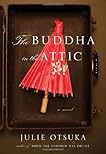 The Buddha in the Attic by Julie Otsuka
My rating: 5 of 5 stars
The Buddha in the Attic by Julie Otsuka
My rating: 5 of 5 stars
A lovely poemovella. Or novellem? How would one categorize this hybrid poem-novella? Whatever its genre, it is without a doubt eloquent and unforgettable. Within this slim volume the history of 20th century Issei and Nisei - first and second generation Japanese immigrants to the western hemisphere - is told by Japanese women, who must "blend into a room", who must "be present without appearing to exist." Otsuka gives these women fearless, tender, angry, sorrowful voices and dares you to not hear.
Countless ships of "picture brides" arrived at docks in California from Japan at the end of World War I. These young girls clutched photographs of handsome young men they would meet for the first time. The mail-order brides were terrified by the uncertainties of living in America, of becoming wives and lovers to strangers. They were ill from the long voyage at sea and desperately homesick - although most had been sent to America to relieve their families of financial burden; they knew their only future was before them, their only home the one they would build with their stranger-husbands. "Deep down, though, most of us were really very happy, for soon we would be in America with our new husbands, who had written to us many times over the months." Their men had written of good jobs, large homes and shiny cars.
Of course, with very few exceptions, these promises were lies. These women left lives as laborers in Yamaguchi rice paddies or Osaka brothels to become laborers in California fields or maids in mansions. But they survived, creating homes and businesses with their husbands and children, most keeping to the shelter of the local Japanese community - either by choice or by expectation - until the onset of Word War II. And then they, along with their families, neighborhoods and communities, disappeared.
The story is familiar; it is Otsuka's style that makes this work revelatory. It is told in an incantatory fashion, by a chorus of a thousand unified voices. Rather than relying on the traditional arc of plot and character development, Otsuka reveals the experience of a generation of immigrants through the poetic sweep of images and emotions. It is a song of oral history tamed by a pen, but only just so.